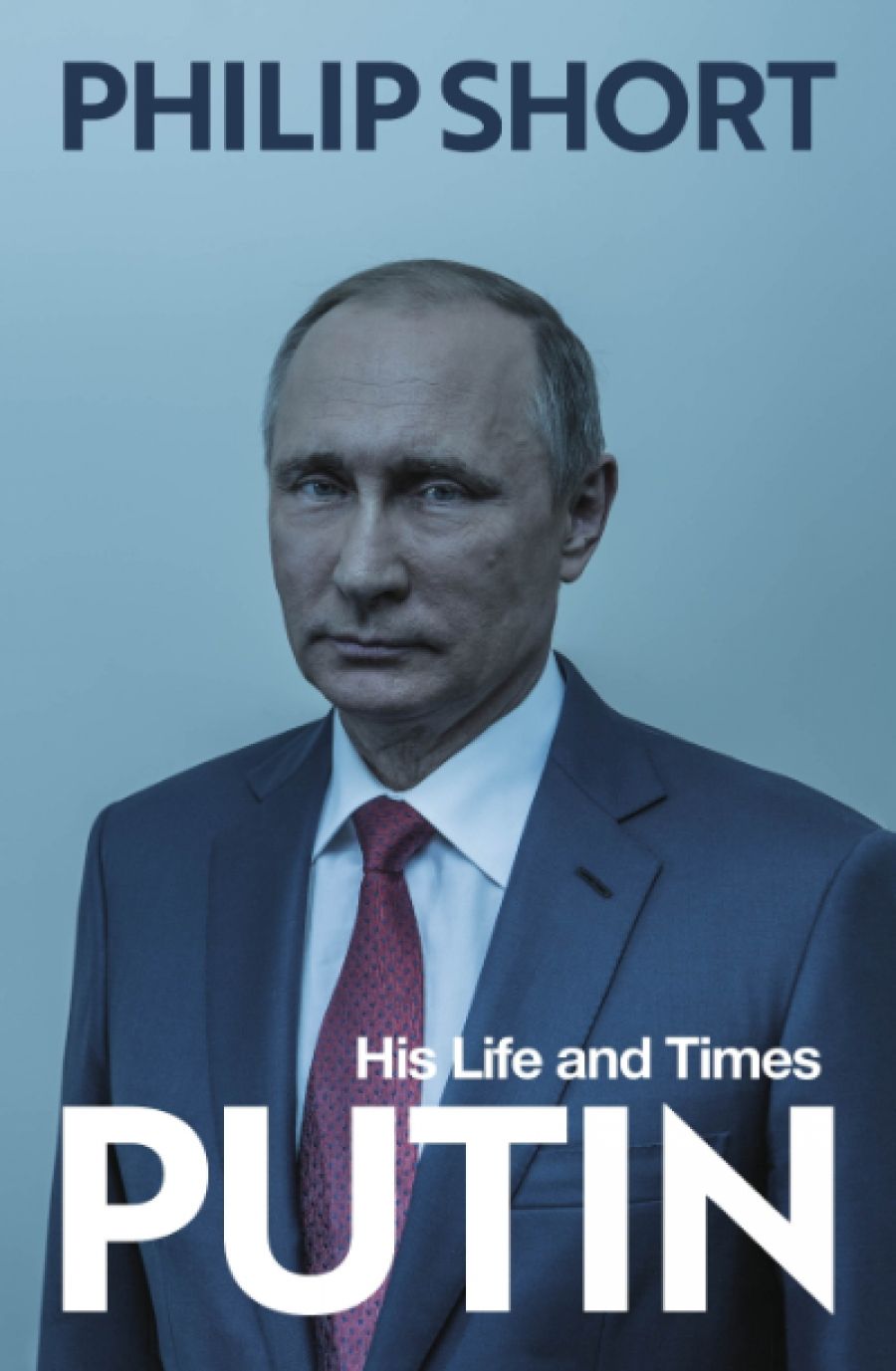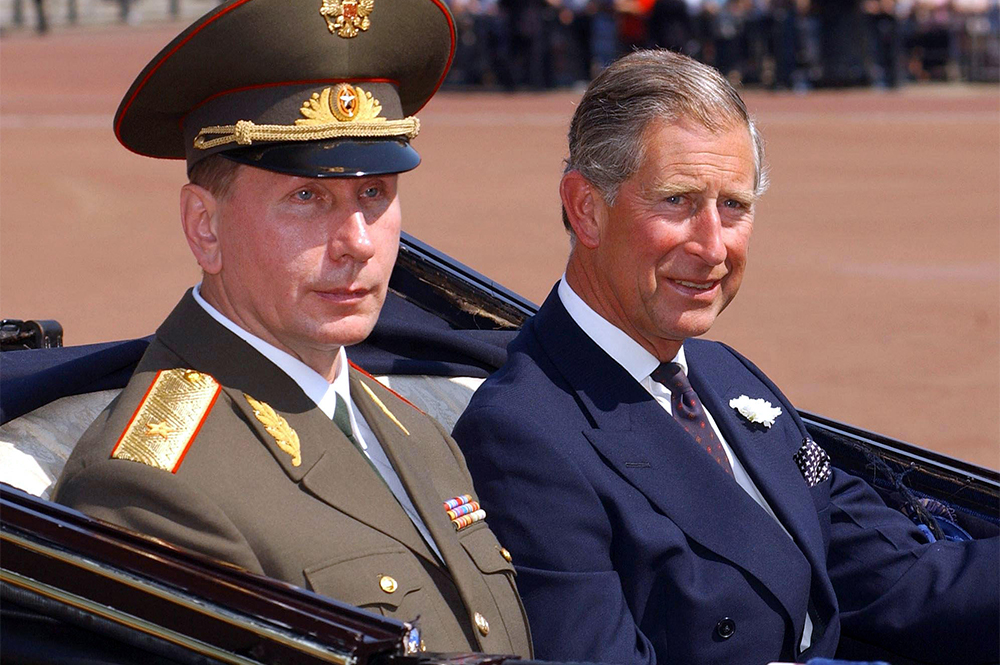
- Free Article: No
- Contents Category: Russia
- Review Article: Yes
- Article Title: Fair means and foul
- Article Subtitle: A measured biography of Vladimir Putin
- Online Only: No
- Custom Highlight Text:
In the era of Russia’s war in Ukraine, who would be a ‘Putinversteher?’ (‘Putin-understander’) is the disdainful German term used for someone trying to negotiate the perilous path between Putin-apologist and Putin-denouncer. Understanding Vladimir Putin means grasping how Putin himself sees the world he is operating upon. Philip Short, a former BBC foreign correspondent in Moscow, has committed himself to this path, and more power to him, say I.
- Article Hero Image (920px wide):

- Article Hero Image Caption: Vladimir Putin and Prince Charles during the Russian president’s state visit, 2003 (Kirsty Wigglesworth/PA Images/Alamy)
- Featured Image (400px * 250px):

- Alt Tag (Featured Image): Sheila Fitzpatrick reviews 'Putin: His life and times' by Philip Short
- Book 1 Title: Putin
- Book 1 Subtitle: His life and times
- Book 1 Biblio: The Bodley Head, $39.99 pb, 864 pp
- Book 1 Readings Link: booktopia.kh4ffx.net/dozmRj
Putin’s KGB service and years as an intelligence operative in Dresden in the 1980s are often seen as the key to understanding him. Short does not discount this, but he stresses other formative experiences as well. The first was the working-class, pro-Soviet milieu in the hardscrabble of postwar Leningrad in which Putin, born in 1952, grew up. Volodya was a self-directed child, thin, shy, prickly, and resistant to authority if he felt he was disrespected. He found his niche in the martial arts. By the time he reached his teens, things were looking up for the family: they acquired a refrigerator and even, remarkably for the times, a car, which his mother won in a lottery. Watching Soviet spy movies, as all his age group did, he formed the aspiration to join the intelligence services, which he did after graduation from law school at Leningrad University.
The collapse of the Soviet Union in 1991, which shocked Putin, and his subsequent work in Anatoly Sobchak’s post-Soviet Leningrad/St Petersburg administration as deputy mayor, were equally formative. Putin, at this point, had no evident political ambitions but ‘saw himself as an administrator’ whose ‘job was to keep the City government running’. Boris Yeltsin’s presidency (1991–99) was the era of ‘wild capitalism’, and Putin’s job brought him into contact with both organised crime and foreign capitalists. Putin himself was not ‘blatantly corrupt’, according to Short, but ‘could live with those who were’; he also eschewed the conspicuous consumption embraced by many of his colleagues. Though never an easy socialiser, he got on well with some of the resident foreigners (including an unabashedly gay American), having concluded that the only way for Russian industrial production to upgrade was via capitalist competition. Russia was ‘part of European culture’, Putin told a BBC interviewer in 2000. He ‘could not imagine my country in isolation from Europe’ and could even envisage Russia joining NATO at some future time – as long as Russia was treated with respect as an equal partner. The next year, after the Twin Towers attack in New York, he went out on a limb (and copped some domestic flak) by quickly offering support to the United States in its ‘war on terror’.
That said, Putin was never a hundred per cent ‘Westerniser’ in the old Russian dichotomy of Westernisers and Slavophiles, and he acquired negative impressions of the West as well, notably with regard to the substantial interference of the United States in the 1996 Russian presidential elections, which left him strongly convinced of Western hypocrisy on such matters. He saw, perhaps in exaggerated terms, signs of similar Western interference in Ukraine’s Orange Revolution in the mid-2000s, which Putin interpreted as the United States ‘stealing Ukraine from under [him]’. Putin had long thought that Russia had got the rough end of the stick over the breakup of the Soviet Union, citing Ukraine’s resistance to any cessation of discounted prices for Russian oil and gas as an example.
Short writes that, in Putin’s first decade as president, ‘Russia had a genuine multiplicity of voices and of economic and political actors. But the limits within which they could operate were decreed from above.’ The economy grew, buoyed by high oil prices, until around 2008, when it started to stagnate. Putin, meanwhile, was moving towards increased intolerance of dissent, coupled with an evidently increasing conviction that Russia needed him to stay at the helm. His social attitudes, probably influenced by his close alliance with the Slavophile Russian Orthodox Church, were becoming more traditional. This suited the older generation, raised with puritanical Soviet mores, but tended to turn off the more cosmopolitan urban younger generation. Political assassinations, whether or not directly ordered by Putin, became more common, provoking outrage in the West. While reporting political opponent Oleg Navalny’s allegations that Putin had built a palatial residence on the Black Sea, Short remains sceptical that money is a major motivator for Putin, noting that in the event that Putin fell or withdrew from power, ‘his future [would] be assured, as Yeltsin’s was, not by money but by the protection of those who [came] after him’.
This biography, researched and written over eight years, seems to be moving towards a conclusion in which an ageing and increasingly detached Putin retires (gracefully, Short surmises) and/or assumes an elder statesman role in Russia. Putin’s Ukrainian adventure in 2022 obviously came as a surprise to Short, as it did to many well-informed observers, prompting some abrupt re-routing of his argument as well as the addition of a seven-page ‘Afterword’ dealing with recent developments. Short’s interpretative emphasis throughout is on Putin’s concern with Russia’s standing and respect in the world (to which NATO membership for Ukraine posed a threat), not with Ukraine and Slavic brotherhood per se. He sees the acquisition of the Crimea in 2014 as opportunistic, Putin seizing a chance for major gain while the Ukrainian government was in turmoil. He got away with it, and eight years later judged that the international situation offered ‘a window of opportunity for one last push to bring Ukraine to heel. It would be a gamble. But if he could carry it off, correcting what he viewed as the cardinal sins of his predecessors, it would be the crowning achievement of his career.’
Short’s Putin is a pragmatist, increasingly souring on the West for what he sees as rebuffs, end-of-Cold-War triumphalism, and hypocrisy. He is not crazy (Short sees him as playing the Nixon card of acting crazy, by implication capable of anything, as a form of deterrence); and, despite the current Western consensus, the invasion of Ukraine was not necessarily a ‘fatal error’, viewed in cold realpolitik terms rather than through a human rights prism. Short notes that not only are China, India, and Indonesia hedging their bets on the invasion, so are ‘notional US partners’ like Saudi Arabia, the Gulf States, and even Israel. The invasion may not have won public expressions of respect from the West (clearly the opposite is the case), yet may nevertheless have secured tacit Western recognition that Russia has returned as a global player – arguably the primary aim of Putin’s foreign policy. ‘By fair means and foul,’ Short concludes, ‘Russia has reasserted itself as a major actor in international affairs.’ Agree or not, that’s something to think about.


Comments powered by CComment